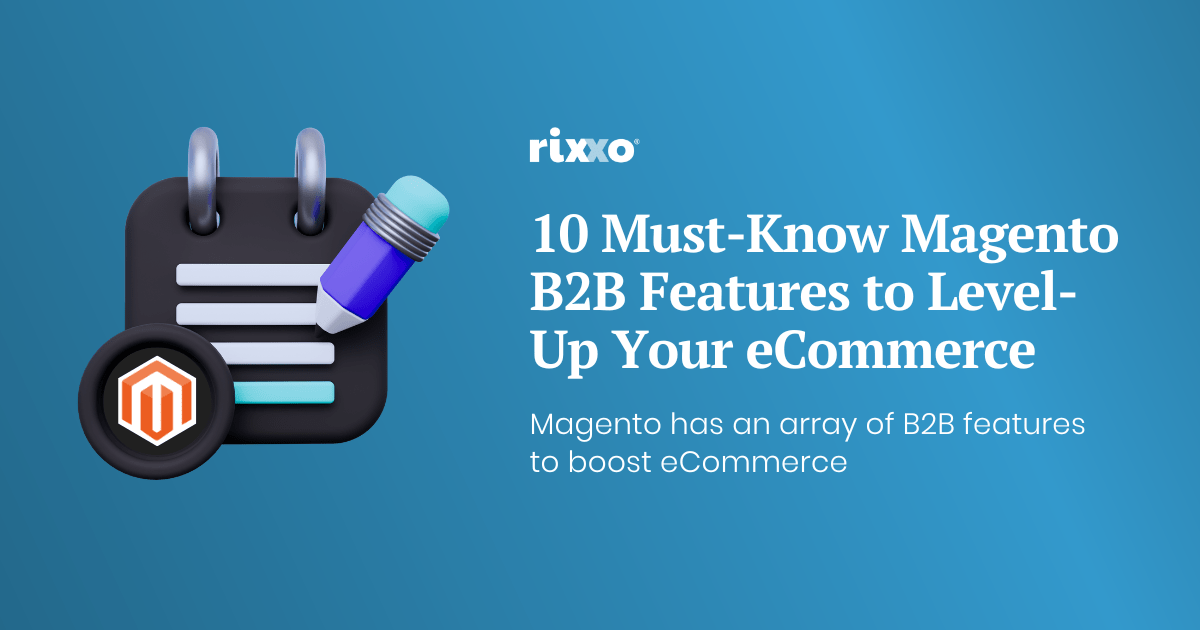10 Must-Know Magento B2B Features to Level-Up Your eCommerce

Are you looking to take your B2B eCommerce store to the next level? Magento is one of the most powerful eCommerce platforms available today and contains many features that can help you do just that. The opportunities are huge, from automated product catalogues to advanced order management tools.
In this blog post, we’ll explore 10 must-know Magento B2B features that eCommerce business owners can use to take their stores to the next level.
Breaking down B2B vs. B2C: Key distinctions in the eCommerce world
eCommerce typically revolves around two core types of transactions: B2B (Business-to-Business) and B2C (Business-to-Consumer). These acronyms represent different buying dynamics, each with unique traits and customer requirements.
Understanding B2B transactions
B2B, or Business-to-Business, represents transactions occurring between two businesses, such as a business seller offering products or services to another business buyer.
What sets a B2B business apart are its specific buyer needs:
– A smooth and efficient buying process
– Reliable relationships with their vendors
– Prompt responses and clear communication
– Content that speaks to their specific needs
Each business market has its unique set of requirements, which needs to be addressed. B2B purchases often involve bulk buying, necessitating meticulous record-keeping. While these transactions can happen via physical documents or emails, they increasingly occur on eCommerce platforms for efficiency.
B2C Sales: Lower volumes, higher engagement
On the flip side, B2C, short for Business-to-Consumer, encapsulates the transactions between a business and the end consumer. This process generally unfolds as a customer browsing for a product online, choosing a delivery method, and finalising their purchase with a preferred payment method.
Unlike B2B, B2C sales generally involve lower volumes and need diverse marketing tactics to drive consumer engagement and sales. Whether it’s a special offer or a newly launched product, the goal in B2C is to attract the consumer and encourage a purchase.
Choosing the right eCommerce platform for B2B: Spotlight on Magento open source


The world of B2B transactions demands a robust and feature-rich eCommerce solution that can cater to the unique requirements of business buyers. The ideal platform should offer advanced functionality, including an effective search feature, and smoothly integrate various add-ons. It should create a great user experience while catering to market trends and business demands.
Enter Magento Open Source.
This platform empowers businesses to craft an eCommerce website brimming with useful features that align with their strategic goals, enable market expansion, and offer innovative features to their clients, all without compromising the user experience.
However, it’s worth noting that Magento Open Source requires a developer with significant technical expertise to build and maintain the site. Therefore, while it provides an array of features and flexibility, it may not be the ideal choice for B2B companies without access to a dedicated Magento development team.
For businesses that lack this technical resource, considering a more packaged solution like BigCommerce or Adobe Commerce might be more suitable. These platforms offer an all-inclusive, user-friendly approach to eCommerce, making them ideal for businesses looking to jumpstart their online presence without the need for extensive technical expertise.
Always ensure to evaluate your resources, business needs, and growth plans before deciding on the right eCommerce platform for your B2B operations. With that said, let’s dive into the 10 features you need to know about to level up your B2B eCommerce business.
1. Custom catalogues and pricing: The power of personalisation with Magento
Magento allows businesses to create custom catalogues and pricing structures for different customer groups. This means you can provide a personalised shopping experience tailored to each client’s needs and preferences, enhancing their engagement with your brand and fostering customer loyalty. This personalisation is not just about making customers feel special; it’s a strategic tool for enhancing your business relationships and driving more sales.
Consider this example:
Let’s say you run a B2B operation supplying restaurant equipment. You have a range of customers from small cafes to large chain restaurants. With Magento, you can create different product catalogues for each type of client.
While the small cafe might see a catalogue featuring compact, cost-effective equipment, the large chain restaurant instead sees a catalogue featuring industrial-grade appliances and bulk deals.
Similarly, you can adjust pricing based on the customer. You might offer bulk-buy discounts to the chain restaurants purchasing in large volumes while providing competitive, affordable prices to the smaller cafes with less demand.
Magento’s custom catalogues and pricing features allow you to offer each customer a personalised, relevant shopping experience, which can lead to higher customer satisfaction, repeat purchases, and ultimately, increased revenue. This level of customisation underscores the platform’s strength as a powerful tool for B2B eCommerce.
2. Quote management: Streamlining B2B transactions with Magento
In B2B, quote management is the process where price negotiations happen, making it a critical factor in establishing and maintaining profitable business relationships. Good quote management can help ensure both parties feel they are getting a fair deal, which ultimately strengthens the business relationship and encourages repeat transactions.
This is where Magento shines.
It has a robust Quote Management system, designed to streamline and enhance the negotiation process. With this feature, B2B customers can easily request a quote directly from their shopping cart.
This removes the need for lengthy email threads or time-consuming phone calls, making the negotiation process quicker and more efficient. When a quote request is submitted a notification is sent immediately to the business sales team, who can then review, comment, and even adjust the items, quantities, and prices as per the negotiation. Once you’ve finalised the quote, the customer is notified and can convert the quote into an order with a single click.
This entire process can be managed and tracked within the Magento platform, providing a transparent and effective way to handle quote negotiations.
The Quote Management feature in Magento supports flexible pricing, promotes efficient communication, and drives customer satisfaction. By facilitating an easy negotiation process, Magento helps B2B businesses build stronger, more profitable relationships with their clients.
3. Bulk ordering and quick order: Enhancing efficiency with Magento
Efficiency is key in B2B transactions, and Magento fully embraces this concept with features designed for rapid, hassle-free ordering. Two such features that stand out are Bulk Ordering and Quick Order.
Bulk Ordering is a necessity for most B2B customers, who often need to order products in large quantities. With Magento, customers can place large orders without having to individually add items to their cart. This not only saves a significant amount of time but also reduces the possibility of errors during the ordering process.
As for the Quick Order feature, it’s all about speed. For repeat customers who know exactly what they want, Magento allows them to bypass browsing and directly input product SKUs or upload CSV files with their order details. This way, items can be quickly added to their shopping carts, making the ordering process incredibly fast and efficient.
Both Bulk Ordering and Quick Orders streamline the purchasing experience, saving valuable time for B2B customers.
By providing these features, Magento helps businesses enhance operational efficiency, thus boosting customer satisfaction and, ultimately, contributing to increased revenue.
4. Company Accounts: Powering business flexibility with Magento
One of the key features that make Magento a go-to choice for B2B businesses is its robust support for Company Accounts. Recognising that B2B transactions often involve multiple individuals within an organisation, Magento has designed its platform to accommodate this business reality.
Under the umbrella of a single Company Account in Magento, you can have multiple users, each with different roles and permissions. This structure mirrors the internal hierarchy of a business organisation, making it easier for various team members to engage in the purchasing process while maintaining control and oversight.
For instance, you may have a procurement manager with full access to make purchases, an accountant with permission to view order history and invoices, and a sales manager who can track orders but can’t make purchases. Magento allows you to set up these roles and permissions as per your specific business requirements, providing flexibility and security in managing your eCommerce operations.
Notably, this feature streamlines the purchasing process, reduces the risk of errors, and ensures accountability within the company’s buying process. By supporting multiple users with varying permissions under a single company account, Magento provides a platform that’s tailor-made for the intricate workings of B2B transactions.
5. Credit Purchase: Streamlining B2B transactions with Magento
In B2B, credit purchases are a common practice, often serving as the backbone of the business relationship. Understanding this, Magento has inbuilt mechanisms to handle credit terms effectively and efficiently.
Magento supports a company-specific credit system which can be customised according to the agreements between your business and your clients. This feature allows for flexible payment options, where businesses can set credit limits for different customers and manage the credit data centrally. Magento’s credit management capabilities are an excellent way to strengthen trust with clients, as they allow for personalised, flexible purchasing terms.
In addition, Magento aids in tracking all credit transactions, providing a clear, transparent record of all purchases made on credit. This not only simplifies the bookkeeping process but also ensures accuracy and accountability.
With its strong focus on customer experience, Magento acknowledges the importance of flexible financial interactions in B2B commerce. By facilitating credit purchases, it simplifies a traditionally complex process, increasing overall customer satisfaction and ensuring smoother, more efficient business operations.
6. Integrations: Automating operations with Magento’s software Integrations


In a dynamic B2B environment, the ability to integrate with existing software systems is paramount. Magento’s open architecture allows it to easily integrate with common B2B software systems. This includes Customer Relationship Management (CRM) software, Enterprise Resource Planning (ERP) systems, and accounting software, among others. These integrations allow businesses to synchronise data across multiple platforms, resulting in a unified view of business operations and customer interactions.
For instance, with Magento’s integration capabilities, changes to inventory levels in your ERP system can be automatically reflected on your eCommerce platform, ensuring accurate and real-time inventory data. Similarly, customer information from your CRM can be synchronised with Magento to provide personalised customer experiences.
Magento supports integration with various payment gateways, shipping providers, and marketing tools. This empowers businesses to provide a consistent and optimised customer journey from product discovery to purchase and delivery.
Magento’s ability to seamlessly integrate with various software systems not only increases operational efficiency but also helps businesses provide a seamless and personalised experience to their customers. With Magento, businesses can have an interconnected ecosystem that streamlines their operations and enhances their competitiveness in the B2B market.
7. Mobile experience: Emphasising mobile-friendly design with Magento
Having a mobile-friendly design isn’t just a nice-to-have, but a necessity. Research shows that a significant number of B2B buyers use mobile devices during their purchase journey. Magento understands this shift and ensures that B2B websites cater to this growing demographic.
Magento offers responsive design templates that automatically adjust your website layout based on the device accessing it. This means whether your customers are using a smartphone, tablet, or desktop computer, they’ll enjoy a seamless and user-friendly browsing experience. This optimises their ability to browse products, compare pricing, and finalise purchases on the go, enhancing customer satisfaction and loyalty.
8. Powerful search
Product discovery is a key aspect of the eCommerce experience. Magento makes this process effortless for customers through its integration with Elasticsearch, a powerful and flexible search and analytics engine.
Elasticsearch helps customers find exactly what they’re looking for by delivering high-speed, relevant search results. It supports multiple languages, handles typos, and can easily scale with your product catalogue’s growth. With autocomplete and faceted search features, it provides customers with a smooth and intuitive shopping experience, ultimately leading to higher conversion rates.
9. Advanced marketing tools: Boosting visibility and engagement with Magento
Success in eCommerce demands more than just a functional online store. It requires effective marketing to attract, engage, and retain customers. Magento shines in this area by offering advanced marketing tools tailored to the needs of B2B businesses.
Magento supports Search Engine Optimisation (SEO) right out of the box, helping your website rank higher in search engine results and increasing your visibility to potential customers. It integrates seamlessly with popular email marketing platforms, allowing you to easily manage and track your email campaigns.
Magento’s customer segmentation feature enables you to group customers based on specific criteria, such as location, purchase history, or behaviour. This feature enables personalised marketing, allowing businesses to target their marketing efforts more effectively.
In summary, Magento’s advanced marketing tools provide businesses with the ability to improve their online visibility, reach their target audiences more effectively, and ultimately drive more conversions and customer loyalty.
10. Scalability: Embracing growth with Magento’s expandable framework
Scalability is not a luxury in today’s dynamic business environment; it’s a necessity, particularly for B2B companies eyeing growth and expansion. A scalable eCommerce platform allows your business to meet increasing demand, accommodate a growing product catalogue, and manage a rise in customer traffic, all without compromising performance.
Magento has been engineered with scalability in mind. Its robust architecture allows your business to grow without worrying about the website’s ability to handle additional load. Whether you’re expanding your product range, entering new markets, or experiencing a surge in customer traffic, Magento can easily scale to accommodate these changes.
Magento’s scalability extends to its feature set as well. As your business grows and evolves, so do your eCommerce needs. With Magento, you can easily add new features, integrate additional third-party tools, and customise your site’s functionality to align with your evolving business strategies.
By choosing Magento, you’re not just selecting a platform for your current needs, but investing in a solution that will continuously adapt and scale to your future business growth. This makes Magento a long-term, value-adding partner for your B2B eCommerce journey.
Conclusion: Embracing the B2B eCommerce revolution with Magento
The advantages of a B2B eCommerce platform such as Magento are clear. Magento not only supports a range of transactional features such as customised catalogues, price lists, credit purchases, and advanced search functionality but also provides scalability, integration capabilities, and a mobile-friendly user experience.
Its robust architecture allows businesses to streamline operations, improve customer engagement, and, crucially, grow without technological limitations.
Each of these features helps to build a dynamic, efficient, and customer-focused B2B eCommerce presence. From catalogue customisation to responsive design templates, from Elasticsearch technology to advanced marketing tools, Magento covers every aspect of your B2B eCommerce needs. The platform goes beyond mere transactions, helping you cultivate meaningful, lasting relationships with your customers.
Magento is more than an eCommerce platform; it’s a powerful tool that, with the right expertise and planning, transforms businesses, drives efficiencies, and unlocks growth potential.
That’s where we, at Rixxo, can help. We are a B2B eCommerce agency with more than a decade of experience in Magento. We can guide you through the process, ensuring your business reaps the full benefits of this dynamic platform.
Ready to leverage the power of Magento and transform your B2B operations?
